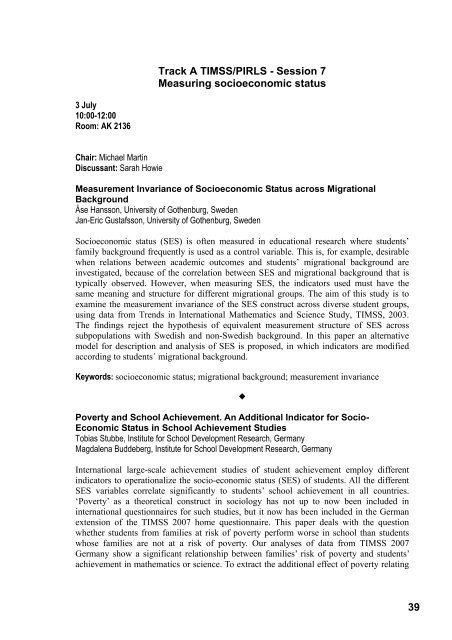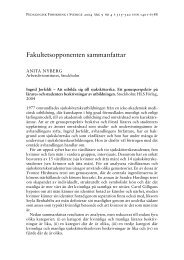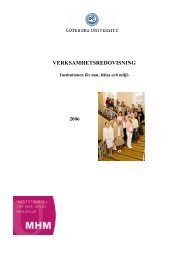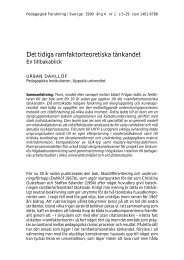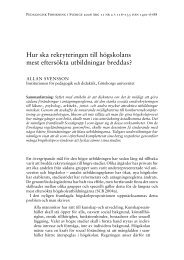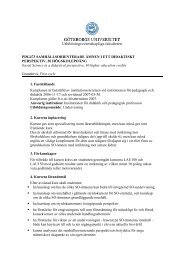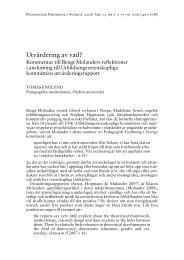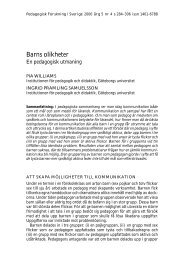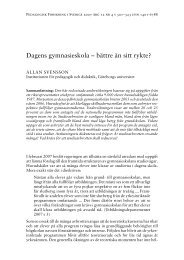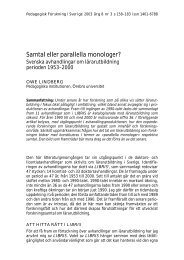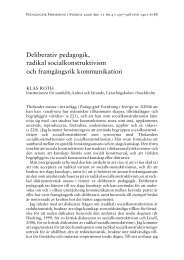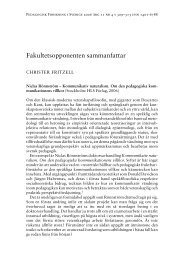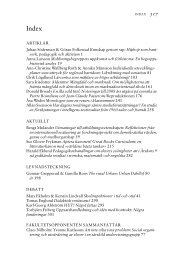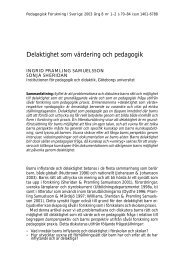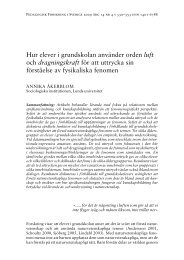University of Oslo Workshops June 29-30 Conference July 1-3 ...
University of Oslo Workshops June 29-30 Conference July 1-3 ...
University of Oslo Workshops June 29-30 Conference July 1-3 ...
Create successful ePaper yourself
Turn your PDF publications into a flip-book with our unique Google optimized e-Paper software.
Track A TIMSS/PIRLS - Session 7<br />
Measuring socioeconomic status<br />
3 <strong>July</strong><br />
10:00-12:00<br />
Room: AK 2136<br />
Chair: Michael Martin<br />
Discussant: Sarah Howie<br />
Measurement Invariance <strong>of</strong> Socioeconomic Status across Migrational<br />
Background<br />
Åse Hansson, <strong>University</strong> <strong>of</strong> Gothenburg, Sweden<br />
Jan-Eric Gustafsson, <strong>University</strong> <strong>of</strong> Gothenburg, Sweden<br />
Socioeconomic status (SES) is <strong>of</strong>ten measured in educational research where students’<br />
family background frequently is used as a control variable. This is, for example, desirable<br />
when relations between academic outcomes and students’ migrational background are<br />
investigated, because <strong>of</strong> the correlation between SES and migrational background that is<br />
typically observed. However, when measuring SES, the indicators used must have the<br />
same meaning and structure for different migrational groups. The aim <strong>of</strong> this study is to<br />
examine the measurement invariance <strong>of</strong> the SES construct across diverse student groups,<br />
using data from Trends in International Mathematics and Science Study, TIMSS, 2003.<br />
The findings reject the hypothesis <strong>of</strong> equivalent measurement structure <strong>of</strong> SES across<br />
subpopulations with Swedish and non-Swedish background. In this paper an alternative<br />
model for description and analysis <strong>of</strong> SES is proposed, in which indicators are modified<br />
according to students´ migrational background.<br />
Keywords: socioeconomic status; migrational background; measurement invariance<br />
Poverty and School Achievement. An Additional Indicator for Socio-<br />
Economic Status in School Achievement Studies<br />
Tobias Stubbe, Institute for School Development Research, Germany<br />
Magdalena Buddeberg, Institute for School Development Research, Germany<br />
<br />
International large-scale achievement studies <strong>of</strong> student achievement employ different<br />
indicators to operationalize the socio-economic status (SES) <strong>of</strong> students. All the different<br />
SES variables correlate significantly to students’ school achievement in all countries.<br />
‘Poverty’ as a theoretical construct in sociology has not up to now been included in<br />
international questionnaires for such studies, but it now has been included in the German<br />
extension <strong>of</strong> the TIMSS 2007 home questionnaire. This paper deals with the question<br />
whether students from families at risk <strong>of</strong> poverty perform worse in school than students<br />
whose families are not at a risk <strong>of</strong> poverty. Our analyses <strong>of</strong> data from TIMSS 2007<br />
Germany show a significant relationship between families’ risk <strong>of</strong> poverty and students’<br />
achievement in mathematics or science. To extract the additional effect <strong>of</strong> poverty relating<br />
39


